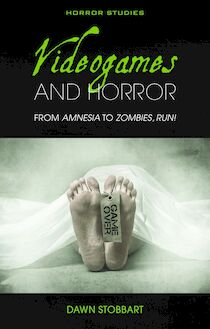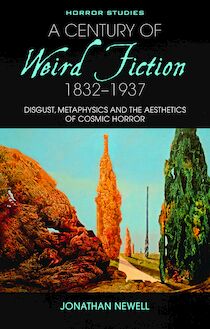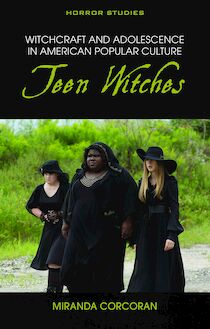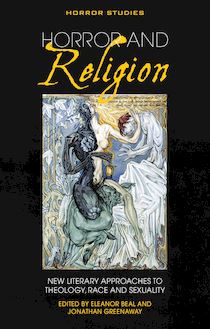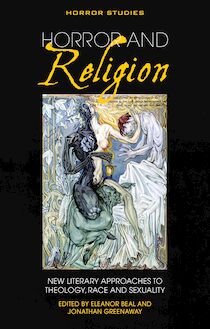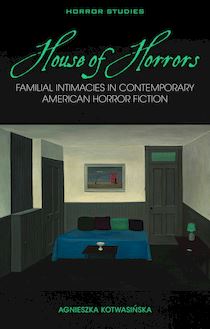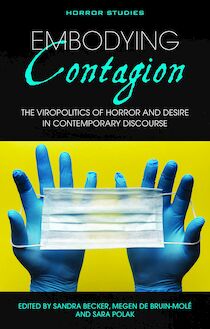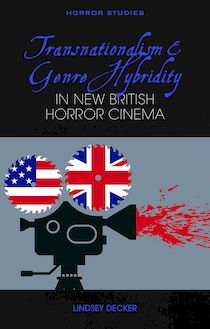-
 Univers
Univers
-
 Ebooks
Ebooks
-
 Livres audio
Livres audio
-
 Presse
Presse
-
 Podcasts
Podcasts
-
 BD
BD
-
 Documents
Documents
-
- Cours
- Révisions
- Ressources pédagogiques
- Sciences de l’éducation
- Manuels scolaires
- Langues
- Travaux de classe
- Annales de BEP
- Etudes supérieures
- Maternelle et primaire
- Fiches de lecture
- Orientation scolaire
- Méthodologie
- Corrigés de devoir
- Annales d’examens et concours
- Annales du bac
- Annales du brevet
- Rapports de stage
La lecture à portée de main
Vous pourrez modifier la taille du texte de cet ouvrage
Découvre YouScribe en t'inscrivant gratuitement
Je m'inscrisDécouvre YouScribe en t'inscrivant gratuitement
Je m'inscrisEn savoir plus
Vous pourrez modifier la taille du texte de cet ouvrage
En savoir plus

Description
Zombies have become an increasingly popular object of research in academic studies and, of course, in popular media. Over the past decade, they have been employed to explain mathematical equations, vortex phenomena in astrophysics, the need for improved laws, issues within higher education, and even the structure of human societies. Despite the surge of interest in the zombie as a critical metaphor, no coherent theoretical framework for studying the zombie actually exists. Addressing this current gap in the literature, Theorising the Contemporary Zombie defines zombiism as a means of theorising and examining various issues of society in any given era by immersing those social issues within the destabilising context of apocalyptic crisis; and applying this definition, the volume considers issues including gender, sexuality, family, literature, health, popular culture and extinction.
Contents:
Abstract
Author Biographies
List of Figures
Introduction - Scott Hamilton and Conor Heffernan
I. Zombified Bodies
1. Zombies, Deviance, and the Right to Posthuman Life - Poppy Wilde (Birmingham City University)
2. The Apocalypse Workout: Health, Identity and Zombies - Conor Heffernan (University of Texas at Austin)
3. Zombie Orgies and the Fear of the Outer Limits: Examining the Relationship between Fear, Pornography and Zombies - Caroline West (Dublin City University)
4. Aloha-oe: Hello, Goodbye to Love and Family in Sang-ho Yeon’s Train to Busan - Harvey O’Brien (University College Dublin)
II. Critical Environments
5. The Stalking Dead: Ireland’s Ambiguous Revenants and the Case for a Folk-Zombie Revival - Jack Fennell (University of Limerick)
6. M.R. Carey’s The Boy on the Bridge: Ethics and the Apocalypse - Scott Eric Hamilton (University College Dublin)
7. Zombie Colony: The Heteronomy of the Greek State & The Datura of Cultural Capital - Konstantinos Kerasovitis (University of Wolverhampton)
8. Last Ones Left Alive: Zombies and Post-Politics - Deirdre Flynn (University College Dublin)
III. Undead Cultures
9. Beware the Zuvembies: Comics, Censorship, and the Ubiquity of Not-Quite-Zombies - Chera Kee (Wayne State University)
10. Distortions of the Video Dead: The Degradation of Reality in the Era of Zombie VHS - Peter Wright (The University of Sydney)
11. ‘Violence is Italian art’: Art and Adaptation in Lucio Fulci’s ‘Gates of Hell’ Trilogy - Miranda Corcoran (University College Cork)
12. Surviving the Shambling Signifieds: Zombies, Language, and Chaos - Andrew Ferguson (University of Maryland)
Bibliography
Index
Sujets
Informations
| Publié par | University of Wales Press |
| Date de parution | 15 mai 2022 |
| Nombre de lectures | 4 |
| EAN13 | 9781786838599 |
| Langue | English |
Informations légales : prix de location à la page 0,2850€. Cette information est donnée uniquement à titre indicatif conformément à la législation en vigueur.
Extrait
THEORISING THE CONTEMPORARY
Zombie
HORROR STUDIES
Series Editor
Xavier Aldana Reyes, Manchester Metropolitan University
Editorial Board
Stacey Abbott, Roehampton University
Linnie Blake, Manchester Metropolitan University
Harry M. Benshoff, University of North Texas
Fred Botting, Kingston University
Steven Bruhm, Western University
Steffen Hantke, Sogang University
Joan Hawkins, Indiana University
Alexandra Heller-Nicholas, Deakin University
Agnieszka Soltysik Monnet, University of Lausanne
Bernice M. Murphy, Trinity College Dublin
Johnny Walker, Northumbria University
Maisha Wester, Indiana University Bloomington
Preface
Horror Studies is the first book series exclusively dedicated to the study of the genre in its various manifestations – from fiction to cinema and television, magazines to comics, and extending to other forms of narrative texts such as video games and music. Horror Studies aims to raise the profile of Horror and to further its academic institutionalisation by providing a publishing home for cutting-edge research. As an exciting new venture within the established Cultural Studies and Literary Criticism programme, Horror Studies will expand the field in innovative and student-friendly ways.
THEORISING THE CONTEMPORARY
Zombie
CONTEXTUAL PASTS, PRESENTS, AND FUTURES
EDITED BY SCOTT ERIC HAMILTON AND CONOR HEFFERNAN
© The Contributors, 2022
All rights reserved. No part of this book may be reproduced in any material form (including photocopying or storing it in any medium by electronic means and whether or not transiently or incidentally to some other use of this publication) without the written permission of the copyright owner except in accordance with the provisions of the Copyright, Designs and Patents Act. Applications for the copyright owner’s written permission to reproduce any part of this publication should be addressed to the University of Wales Press, University Registry, King Edward VII Avenue, Cardiff, CF10 3NS.
www.uwp.co.uk
British Library Cataloguing-in-Publication Data
A catalogue record for this book is available from the British Library.
ISBN 978-1-78683-857-5
eISBN 978-1-78683-859-9
The rights of The Contributors to be identified as authors of this work have been asserted in accordance with sections 77 and 79 of the Copyright, Designs and Patents Act 1988.
The publisher has no responsibility for the persistence or accuracy of URLs for any external or third-party internet websites referred to in this book, and does not guarantee that any content on such websites is, or will remain, accurate or appropriate.
Contents
Abstract
Author Biographies
List of Figures
Introduction
Scott Eric Hamilton and Conor Heffernan
Part One: Zombified Bodies
1. Zombies, Deviance and the Right to Posthuman Life
Poppy Wilde
2. The Apocalypse Workout
Health, Identity and Zombies
Conor Heffernan
3. Abject Bodies and Borders
What Zombies and Porn Indicate about Sex, Stigma and Society
Caroline West
4. Aloha ‘Oe
Goodbye and Hello in Train to Busan (2016)
Harvey O’Brien
Part Two: Critical Environments
5. The Stalking Dead
Ireland’s Ambiguous Revenants and the Case for a Folk-zombie Revival
Jack Fennell
6. M. R. Carey’s The Boy on the Bridge
Ethics and the Apocalypse
Scott Eric Hamilton
7. Zombie Colony
The Heteronomy of the Greek State and the Datura of Cultural Capital
Konstantinos Kerasovitis
8. Last Ones Left Alive
Zombies and Post-Celtic Tiger Ireland
Deirdre Flynn
Part Three: Undead Cultures
9. Beware the Zuvembies
Comics, Censorship and the Ubiquity of Not-quite Zombies
Chera Kee
10. Cinematic Voodoo and the Reanimation of Death
Jacques Tourneur’s I Walked with a Zombie
Peter J. Wright
11. ‘Violence is Italian art’
Art and Adaptation in Lucio Fulci’s ‘Gates of Hell’ Trilogy
Miranda Corcoran
12. Surviving the Shambling Signifieds
Zombies, Language and Chaos
Andrew Ferguson
Bibliography
Abstract
Z OMBIES HAVE BECOME an increasingly popular object of research in academic studies and, of course, in popular media. In the past decade zombies have been employed to explain mathematical equations, vortex phenomena in astrophysics, the need for improved laws, issues within higher education, and even the structure of human societies, to identify only a few examples. This collection expands on previous volumes and marries new topics with older approaches. Reflective of the diversity of Theorising Zombiism(s), the collection offers several new roads of enquiry related to the physical body, posthumanism, the environment and pornography among other topics. Likewise, more traditional areas of research, like zombies and the economy, the films of Lucio Fulci, politics and language are approached through the use of new theoretical frameworks and/or materials. Understanding and defining zombiism as a means of theorising and examining various issues of society within any given era by immersing those social issues within the destabilising context of apocalyptic crisis, this collection studies a series of different contexts and mediums.
Author Biographies
Miranda Corcoran is a lecturer in twenty-first-century literature at University College Cork. Her research interests include Cold War literature, genre fiction, popular fiction, sci-fi, horror and the gothic. She is currently writing a monograph on adolescence and witchcraft in American popular culture. She is also the co-editor (with Steve Gronert Ellerhoff) of Exploring the Horror of Supernatural Fiction: Ray Bradbury’s Elliott Family (Routledge, 2020).
Jack Fennell is a writer, editor, translator and researcher whose academic publications include pieces on science fiction, utopian and dystopian literature, monsters, Irish literature and the legal philosophy of comic books. He is the author of Irish Science Fiction (Liverpool University Press, 2014), a contributing translator for The Short Fiction of Flann O’Brien (Dalkey Archive Press, 2013) and a former visiting fellow at the Moore Institute in NUI Galway.
Andrew Ferguson is a College Postdoctoral Fellow at the University of Virginia. He works at the intersection of media-textual studies, cultural theory and popular culture, which results in him doing things like willingly signing up to write an article that will require watching The Star Wars Holiday Special several times. Other ongoing projects include a study on editorial labour and style in science fiction, essays on born-digital horror and the writings of Dr Chuck Tingle, and a manuscript on glitches and narrative theory.
Dr Deirdre Flynn is a lecturer in twenty-first-century literature at Mary Immaculate College, Limerick. She has worked at University College Dublin, NUI Galway and University of Limerick. Her research interests include world literature, literary urban studies, postmodernism, Haruki Murakami, Irish studies, theatre and feminism. She has written, directed and acted for theatre, and worked as a journalist for over seven years. She is currently preparing a monograph on Haruki Murakami and has published two co-edited collections on Irish literature. From 2015 until 2017, she was the chair of Sibéal, the gender and feminist network.
Scott Eric Hamilton is a former research associate at the University College Dublin Humanities Institute. Hamilton has published in various journals on Samuel Beckett and other topics. He has co-organised a successful series of international conferences entitled ‘Beckett and the “State” of Ireland’ (2001–13), ‘Palimpsests: V International Flann O’Brien Conference’ (2019) and ‘Theorizing Zombiism’ (2019). He has co-edited a volume of essays from both the ‘Theorizing Zombiism’ conference and the ‘Flann O’Brien’ conference as well as guest edited a special issue of The Parish Review: Journal of Flann O’Brien Studies .
Conor Heffernan is a lecturer in the sociology of sport at the University of Ulster. He has published widely on the history of fitness and exercise in the nineteenth and twentieth century. In 2020, Conor published The History of Physical Culture in Ireland with Palgrave MacMillan.
Chera Kee is an associate professor of film and media studies in the Department of English at Wayne State University. Her essays on zombies have been published in the Journal of Popular Film and Television and the edited volume Better Off Dead: The Evolution of the Zombie as Post-Human (Fordham University Press, 2011).
Konstantinos Kerasovitis is a researcher with Wolverhampton University, working towards his PhD in the crux of labour, affect and critical theory.
Harvey O’Brien is currently head of film studies at University College Dublin. He is the author of numerous articles and book chapters relating to film, and is a frequent contributor to Irish radio on the subject. He has also authored Action Movies: The Cinema of Striking Back (Columbia University Press, 2012), The Real Ireland: The Evolution of Ireland in Documentary Film (Manchester University Press, 2004) and co-edited Keeping it Real: Irish Film and Television (Wallflower, 2004).
Caroline West is a lecturer, writer, media commentator, sexpert and podcast host. She qualified with her doctoral degree from Dublin City University. Her research interests focuses on sex, feminism and the body. Aside from academia, Dr West is an active contributor to Irish media on sexual health.
Poppy Wilde is a lecturer in media and communication at Birmingham City University. Her research interests include posthumanism and posthuman subjectivity, digital cultures, game studies, embodiment, performance in online contexts and the lived experience in research methods. More recently her explorations have turned to posthuman conceptions of death, and zombification.
Peter J. Wright is a doctoral student at the University of Sydney. His research explores the interactions between zombies, media and symbolism.
List of Figures
Figure 3.1. Rubin’s Char
-
 Univers
Univers
-
 Ebooks
Ebooks
-
 Livres audio
Livres audio
-
 Presse
Presse
-
 Podcasts
Podcasts
-
 BD
BD
-
 Documents
Documents
-
Jeunesse
-
Littérature
-
Ressources professionnelles
-
Santé et bien-être
-
Savoirs
-
Education
-
Loisirs et hobbies
-
Art, musique et cinéma
-
Actualité et débat de société
-
Jeunesse
-
Littérature
-
Ressources professionnelles
-
Santé et bien-être
-
Savoirs
-
Education
-
Loisirs et hobbies
-
Art, musique et cinéma
-
Actualité et débat de société
-
Actualités
-
Lifestyle
-
Presse jeunesse
-
Presse professionnelle
-
Pratique
-
Presse sportive
-
Presse internationale
-
Culture & Médias
-
Action et Aventures
-
Science-fiction et Fantasy
-
Société
-
Jeunesse
-
Littérature
-
Ressources professionnelles
-
Santé et bien-être
-
Savoirs
-
Education
-
Loisirs et hobbies
-
Art, musique et cinéma
-
Actualité et débat de société
- Cours
- Révisions
- Ressources pédagogiques
- Sciences de l’éducation
- Manuels scolaires
- Langues
- Travaux de classe
- Annales de BEP
- Etudes supérieures
- Maternelle et primaire
- Fiches de lecture
- Orientation scolaire
- Méthodologie
- Corrigés de devoir
- Annales d’examens et concours
- Annales du bac
- Annales du brevet
- Rapports de stage
